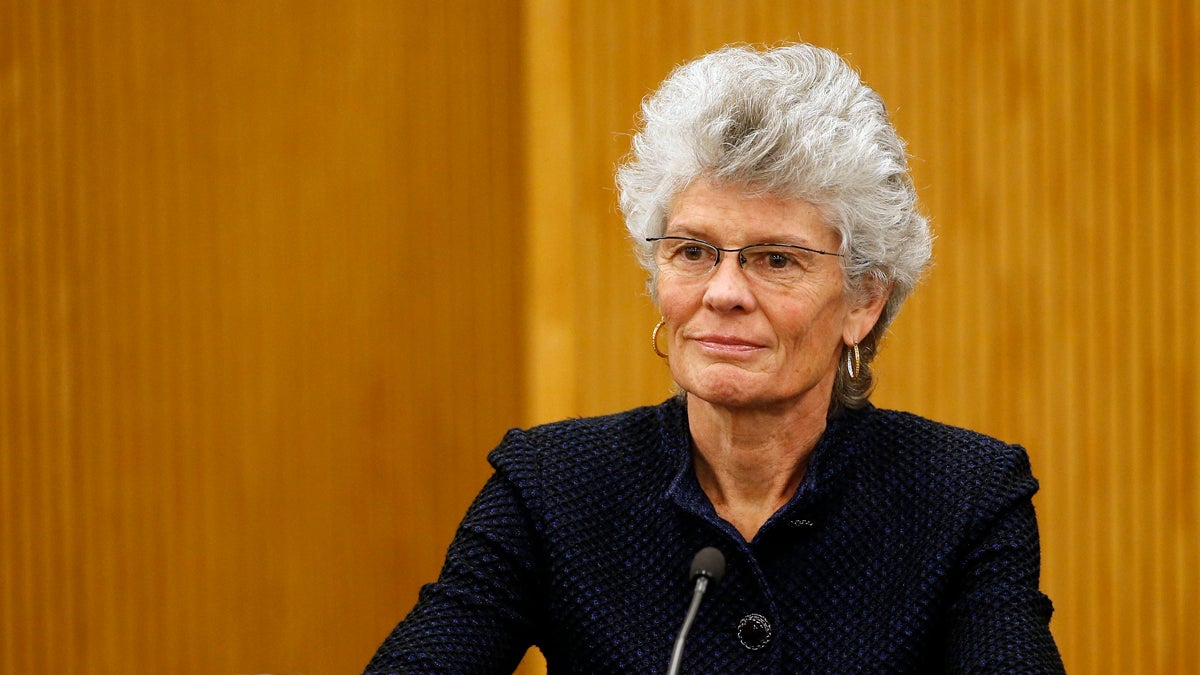Commonwealth Court hears challenge, defense of Philly beverage tax
Listen
During a hearing on the legality of Philadelphia's tax on sweetened beverages, Commonwealth Court Judge Anne Judge Anne Covey questioned the logic of city officials."If it's been so successful for the city of Philadelphia, doesn't that open the door and allow the city to go upstream and tax again?" she said. (AP file photo)
Did the city of Philadelphia enact an illegal double tax by passing the controversial levy on sweetened drinks? Or rather, does the unique structure of the “soda tax” protect it legally?
These questions, debated for months since the American Beverage Association-funded legal challenge of the tax, now sit in front of a panel of seven appeals judges who convened Wednesday in Pittsburgh to hear arguments in a case whose outcome will likely reshape the future of Mayor Jim Kenney’s signature policy.
Although lawyers working on behalf of the beverage industry have attacked the tax as illegal on a number of fronts, nearly all the arguments from both sides focused on a 1932 law known as the Sterling Act, which gave Philadelphia the right to impose its own taxes as long as they are separate from what the state taxes.
Of course, there are exceptions; the Pennsylvania Legislature can pass a law giving the city the special ability to tax. That’s how cigarettes came to be taxed twice — legally — in the city.
When it comes to the 1.5-cents-per-once tax on soda and other sweet drinks, however, the Legislature never granted the city that special privilege.
“The insurmountable problem is that the city does not have the authority to pass this tax,” said Chip Becker, one of the lawyers representing the plaintiffs seeking to strike down the law.
“The city is paddling very hard. They’re trying to create distance between their ordinance and the state sales tax,” he said. “But they are nearly identical.”
Attorney Mark Aronchick believes nothing could be further from the truth. Aronchick, who is part of the city’s legal team, told the judges that since the tax targets drink distributors — not those selling directly to consumers — it’s not a point-of-sale levy and therefore different from the state’s sales tax.
“It is very well within our authority,” Aronchick said. “The state is not taxing distribution transactions.”
The judges, whose questions did not indicate if they were leaning toward either side, appeared skeptical at times, pressing both lawyers for clarification.
“It’s not just distribution. It’s distribution with the intent of putting it up for sale,” said Commonwealth Court Judge Julia Hearthway. “By taxing something up for sale, isn’t that the same as taxing something that is sold?”
At another point, Judge Michael Wojcik said, “If the distributor holds property,” referring to soda and other sugary beverages, “and sends it outside of Philadelphia, there is no tax imposed. And I think that’s key.”
Judge Anne Covey questioned the logic of city officials.
“If it’s been so successful for the city of Philadelphia, doesn’t that open the door and allow the city to go upstream and tax again?” she said.
When Becker raised the point that, while the tax falls on distributors, it ends up hitting consumers’ pocketbooks as if it were a sales tax, Judge Joseph Cosgrove demurred.
“That happens with any tax,” he said. “It’s always going to be passed on to the consumer.”
In some of his final remarks, Aronchick said that every time a new tax is proposed in Pennsylvania, an industry group challenges it in court out of fear that it will hurt business. That’s the case this time, too, he said.
“It’s always, ‘The sky is going to fall,’ and, somehow, the sun always rises and we move forward,” he said.
In response, Becker said, “This is not about the power of the beverage industry. If it is about power, it is about the city’s ability to enact this tax, and the city lacks the power.”
Becker is asking the appeals judges to reverse a trial court decision in December upholding the tax and to declare it unconstitutional.
“If the city put a tax collector at the cash register, it would be against the Sterling Act,” Becker told the judges. “But the city has put the tax collector down the block, but makes sure it catches the bottles and cans as they enter the store.”
The revenue from the sweetened beverage tax — about $12 million in the first two months — is supporting expanded pre-K and civic improvements. That did not come up during the arguments since it has nothing to do with the legal questions. After the hearing, though, Aronchick said no one should forgot about the added pre-K seats and improvements to city parks, recreation centers and libraries the tax will make possible.
“We’re talking about educating 3- and 4-year-old children. We’re talking about obesity and diabetes,” he said. “We’re talking about infrastructure rebuilding and crumbling playgrounds.”
No decision date has been set.
WHYY is your source for fact-based, in-depth journalism and information. As a nonprofit organization, we rely on financial support from readers like you. Please give today.

